Gothamist shares this post-Sandy subway map created by Zach van Schouwen. Looks like a giant lizard took a bite out of New York:
But instead of Robert Downey, Jr. quickly coming up with a plan to save the day with everyone doing their part to help, we have contrarian reporters scolding "you can't PROVE it was the lizard" and Beltway pundits asking "at a time of big deficits, can we afford the plan to fight the giant lizard?"
Real life is the worst.
Wednesday, October 31, 2012
Like a Disaster Movie with Deficit Concern Trolls
Posted by
TheGreenMiles
at
Wednesday, October 31, 2012
Tuesday, October 30, 2012
Seth Meyers on "The Steroid Era of Storms"
Climate scientists compare global warming's impact on weather with the influence of steroids on baseball - it changes the playing field and loads the dice for extreme results.
Last night on Late Night with Jimmy Fallon before an empty studio as Hurricane Sandy raged outside, Seth Meyers took the analogy one step further - just like we ignored that our favorite baseball players were bulking up, the presidential debates have ignored climate change's impact on extreme weather.
Skip to 1:55:
Last night on Late Night with Jimmy Fallon before an empty studio as Hurricane Sandy raged outside, Seth Meyers took the analogy one step further - just like we ignored that our favorite baseball players were bulking up, the presidential debates have ignored climate change's impact on extreme weather.
Skip to 1:55:
Posted by
TheGreenMiles
at
Tuesday, October 30, 2012
Monday, October 29, 2012
Another Unanswered Hurricane Sandy Question
Remind me again why it's against the rules for President Obama to point out that a never-before-seen storm like Hurricane Sandy might be reason to take climate action now? Or that it might be reason for voters to choose candidates who support climate action?
Oh, right. Might anger people who think pointing out scientific reality is politicizing disaster. But aren't those people already voting for Mitt Romney? If not already hosting right-wing talk shows?
Oh, right. Might anger people who think pointing out scientific reality is politicizing disaster. But aren't those people already voting for Mitt Romney? If not already hosting right-wing talk shows?
Posted by
TheGreenMiles
at
Monday, October 29, 2012
Saturday, October 27, 2012
Warmer Water Fueling Hurricane Sandy: How Will Science Deniers Respond?
 Hurricane Sandy is being fueled by water temperatures off the Atlantic Coast that are five degrees warmer than normal, one of several ways global warming is lending strength to the storm.
Hurricane Sandy is being fueled by water temperatures off the Atlantic Coast that are five degrees warmer than normal, one of several ways global warming is lending strength to the storm.How are climate science deniers responding to that fact? Denying the water is warmer? Insisting that the water must be warm for some other reason?
Watts Up With That has a really long post on Sandy that does a great job of seeming like it's responding to the climate link without actually doing so (Sandy is just like Hazel which happened in 1954, so it can't be global warming! ... except Sandy formed a full 17 days later in the year) and avoids the water temperature question altogether. National Review's Planet Gore has barely responded to Sandy at all. Climate Depot ... whew, I'd never actually been there and the site's layout is such a mess good luck finding anything, but it seems to be responding to climate change's influence on Sandy by plugging its ears and yelling NO NO NO NOT HAPPENING.
Anyone seen a climate denier response to warmer water temperatures fueling Sandy? If so, post the link in comments. Thanks!
Posted by
TheGreenMiles
at
Saturday, October 27, 2012
Thursday, October 25, 2012
Hurricane Sandy, Climate Change & New England's Stormy Future
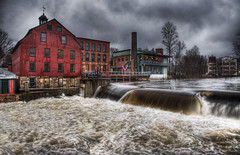 A new report from Rep. Ed Markey on the impact of climate change on New England:
A new report from Rep. Ed Markey on the impact of climate change on New England:Rep. Ed Markey (D-Mass.) today released a report that pulls together the latest studies on climate change’s negative effects on New England, painting a picture of a region already changed, and in danger of losing essential characteristics and economic engines.Stronger storms, weatier summers, slushy skiing, lower maple syrup production, more ticks, fewer of the tastiest fish ... not a pretty picture.
“If climate change continues unchecked, Hurricane Sandy won’t be our October surprise, it could be the new normal for New England, where dangerous storms and other climate effects put lives and livelihoods in danger,” said Rep. Markey, who is the top Democrat on the Natural Resources Committee and the co-author of the only climate change bill to pass a chamber of Congress. “The Perfect Storm was supposed to be a once-in-a-lifetime event, but climate change is increasing the chances of these sorts of historic extreme weather events.” [...]
“We have some of the best skiing, fishing and foliage in the world in New England, and it all is at risk due to climate change,” said Rep. Markey. “In order to save our traditions, we need more innovations that will cut the carbon pollution that is changing the very face of our planet.”
Let's drill down into what we know about climate change and Sandy as she approaches the East Coast. How is man-made global warming influencing to the storm? Two of the key ways: Warmer water and changing weather patterns. Weather Underground's Jeff Masters details the warm water's influence:
If Sandy makes landfall farther to the north near Maine and Nova Scotia, heavy rains will be the main threat, since the cold waters will weaken the storm significantly before landfall. The trees have fewer leaves farther to the north, which will reduce the amount of tree damage and power failures compared to a more southerly track. However, given that ocean temperatures along the Northeast U.S. coast are about 5°F above average, there will be an unusually large amount of water vapor available to make heavy rain. If the trough of low pressure approaching the East Coast taps into the large reservoir of cold air over Canada and pulls down a significant amount of Arctic air, the potential exists for the unusually moist air from Sandy to collide with this cold air from Canada and unleash the heaviest October rains ever recorded in the Northeast U.S., Nova Scotia, and New Brunswick. This Northeast U.S. scenario would probably cause damages near $100 million dollars.
Climate Central's Andrew Freedman explains the shifting patterns:
Such a scenario looks plausible partly due to an unusual, independent weather pattern projected for early next week: a large dome of high pressure between the Canadian Maritimes and Greenland, which may act as a block (it's tecnically known as as a “blocking high”), preventing Sandy from moving out into the open ocean, and instead helping to direct it northwestward, back toward the U.S.
Recent studies have shown that blocking highs have appeared with greater frequency and intensity in recent years, which some scientists think may be related to the loss of Arctic sea ice as a result global warming.
And this is just one impact of climate change in one corner of the country - similar stories are playing out with wildfires in the West, drought in the Midwest, and floods in the South. Yet climate change is barely mentioned on the campaign trail.
Why aren't all the Very Serious People seeking Tough Choices to Real Problems silent on climate solutions? You don't think they're only talking about the deficit as an excuse to slash or eliminate Social Security, Medicare & Medicaid to fund tax cuts for themselves because they don't actually care about current or future poor people, do you?
Why aren't all the Very Serious People seeking Tough Choices to Real Problems silent on climate solutions? You don't think they're only talking about the deficit as an excuse to slash or eliminate Social Security, Medicare & Medicaid to fund tax cuts for themselves because they don't actually care about current or future poor people, do you?
Posted by
TheGreenMiles
at
Thursday, October 25, 2012
Wednesday, October 24, 2012
Another Polluter Front Group Issues Fake Climate Report
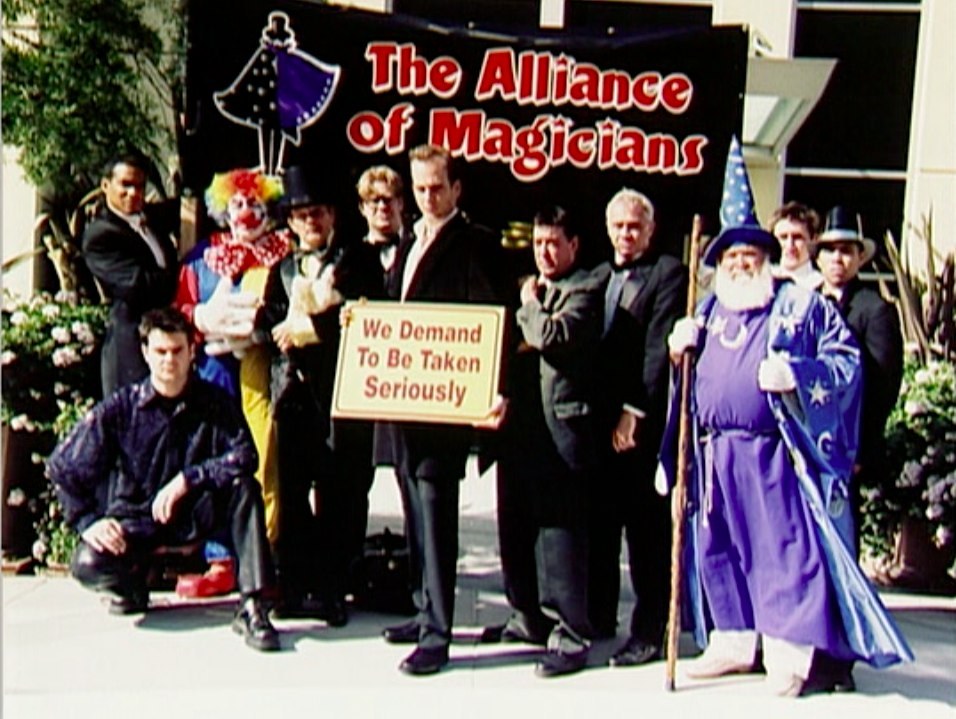 The Cato Institute, a former big tobacco front group that now shills for big polluters, is putting out a phony report designed to fool reporters into thinking it's related to an actual U.S. government climate science report.
The Cato Institute, a former big tobacco front group that now shills for big polluters, is putting out a phony report designed to fool reporters into thinking it's related to an actual U.S. government climate science report.It's not the first time a polluter front group has tried to trick reporters. Back in 2008, the Heartland Institute put out the "NIPCC report," trying to glom onto the U.N.'s Intergovernmental Panel on Climate Change report.
What's most bizarre is that Cato and Heartland then go around whining that no one takes them seriously as an authority on climate science.
It would be like me going up on stage in a wig & skinny jeans, calling myself Justin Biemer, and singing "Boyfriend," then complaining no one took me seriously as an artist.
Posted by
TheGreenMiles
at
Wednesday, October 24, 2012
Tuesday, October 23, 2012
Why Won’t Inhofe’s Pro-Pollution, Anti-Women Tour Stop in MA for Scott Brown?
Hey, Sen. Jim Inhofe! You forgot to include Scott Brown in your "give me a Republican Senate so I can let Big Oil and Big Coal murder the Environmental Protection Agency" tour!
Sen. James Inhofe (R-Okla.) is hitting the road to fire up support for GOP Senate candidates opposed to Obama administration rules on coal and other energy sources.Inhofe's due to stop in Montana, Missouri and Ohio. Surely, it must be some sort of oversight that Sen. Inhofe isn't making a stop in Massachusetts, amirite?
“We’re real close to a presidential election win and close to an election that will elect [Montana Republican Senate candidate] Denny Rehberg and give us a majority," Inhofe said, according to the Billings Gazette. [...]Elizabeth Warren detailed the Brown-Inhofe connection at the first debate:
Montana was Inhofe's first stop on a three-state swing in which he will stump for candidates who want to repeal environmental rules the Oklahoman opposes. The current ranking member of the Senate Committee on Environment and Public Works, Inhofe is in line to take the chair if Republicans control the Senate.
Sen. Brown has been going around the country talking to people saying you've gotta contribute to his campaign because it may be for the control of the Senate. And he's right. This race may really be for the control of the Senate. But what that would mean is, if the Republicans take over the Senate, Jim Inhofe would become the person who would be in charge of the committee that oversees the Environmental Protection Agency. He's a man who's called global warming a hoax. In fact, that's the title of his book. A man like that should not be in charge of the Environmental Protection Agency overseeing their work. I just don't understand how we could talk about going in that direction.Read more about why electing Scott Brown would help Sen. Inhofe run wild in a Republican Senate, leading to disaster for our climate, air & water quality and for women's rights, at KeepTheSenateBlue.com.
Posted by
TheGreenMiles
at
Tuesday, October 23, 2012
Mann Fights Back, Sues Climate Science Slimers
 The Republican war on science faces a new counterattack - a libel lawsuit filed by climate scientist Michael Mann against the National Review and Competitive Enterprise Institute.
The Republican war on science faces a new counterattack - a libel lawsuit filed by climate scientist Michael Mann against the National Review and Competitive Enterprise Institute.From Mann's Facebook page:
Dr. Mann, a Professor and Director of the Earth System Science Center at Pennsylvania State University, has instituted this lawsuit against the two organizations, along with two of their authors, based upon their false and defamatory statements accusing him of academic fraud and comparing him to a convicted child molester, Jerry Sandusky. [...]Virginia Attorney General Ken Cuccinelli clumsy attempt at "investigating" Dr. Mann's work was laughed out of court. Mann has been contemplating a lawsuit for months and is now moving forward, so he must feel he has a much stronger legal case than science's hapless enemies.
In response to these types of accusations, the U.S. Environmental Protection Agency, the National Science Foundation and seven other organizations have conducted investigations into Dr. Mann’s work, finding any and all allegations of academic fraud to be baseless. Every investigation—and every replication of Mann’s work—has concluded that his research and conclusions were properly conducted and fairly presented.
Despite their knowledge of the results of these many investigations, the defendants have nevertheless accused Dr. Mann of academic fraud and have maliciously attacked his personal reputation with the knowingly false comparison to a child molester. The conduct of the defendants is outrageous, and Dr. Mann will be seeking judgment for both compensatory and punitive damages.
Posted by
TheGreenMiles
at
Tuesday, October 23, 2012
Like Affordable Housing? Oppose Parking Minimums
 Even within the city limits of Boston, one of America's great walkable cities & home to one of the country's most-used transit systems, developers are required to build a minimum of half a space for each unit of housing up to a ridiculous 1.5 parking spaces per unit of housing, whether the residents want them or not. It adds to the cost of housing and adds an incentive to drive - if you're forced to pay for a parking spot, you feel like you should keep a car there (or at least a large, rectangular box).
Even within the city limits of Boston, one of America's great walkable cities & home to one of the country's most-used transit systems, developers are required to build a minimum of half a space for each unit of housing up to a ridiculous 1.5 parking spaces per unit of housing, whether the residents want them or not. It adds to the cost of housing and adds an incentive to drive - if you're forced to pay for a parking spot, you feel like you should keep a car there (or at least a large, rectangular box).But some mavericky developers are boldly refusing to build things their customers don't want to pay for:
One of those developers is Dave Mullens with the Urban Development Group. He opened the Irvington Garden in a close-in Northeast Portland neighborhood last year. It’s 50 units with no parking places.And when some renters DO park on the street? Duncan Black flagged the worst horror stories single-family-home-owning neighbors have had to offer:
“The cost of parking would make building this type of project on this location unaffordable,” Mullens says.
Mullens calls the difference “tremendous.”
“Parking a site is the difference between a $750 apartment and a $1,200 apartment. Or, the difference between apartments and condos,” he says. Mullens says the current market is friendlier for affordable rental apartments than for condominiums. He says the Irvington Garden filled within weeks of opening, and has remained that way. He says the majority of renters don’t have cars – though some do, and park on the street.
“The personal anecdotes I’ve heard have to do with elderly relatives coming to visit, or driving into the neighborhood, and having to park a block or two away, and/or fears about that.”Parking a block or two away??
Posted by
TheGreenMiles
at
Tuesday, October 23, 2012
Monday, October 22, 2012
Is PEER's New England Chapter Lost in the Woods?
Public Employees for Environmental Responsibility does some great work nationally, but the PEER New England Chapter's strong opposition to an offshore wind project has split the group from many of its traditional allies in the conservation community, with its opposition to a public transportation initiative also raising eyebrows.
While most conservation groups are supporting Cape Wind or at least staying neutral, PEER's New England Chapter has joined wealthy oil baron William Koch in vehemently opposing the project. Even though Cape Wind would lead to massive reductions in air pollution, including the greenhouse gases fueling the climate change that threatens people and wildlife, PEER New England Chapter Chair Kyla Bennett says the potential threats to wildlife are too great. Mr. Koch, for his part, wants you to believe his opposition is all about environmental preservation and not at all about protecting the views of a handful of wealthy Cape Cod landowners.
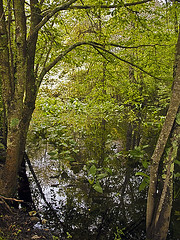 PEER's New England Chapter is also the environmental group most often cited in opposing a plan to extend commuter rail from Boston to the SouthCoast cities of Fall River and New Bedford, both in desperate need of an economic boost. Despite highways clogged due to limited transit options and extensive environmental reviews, PEER's New England Chapter says trains wouldn't be worth the money and would cause irreparable damage to the Hockomock Swamp.
PEER's New England Chapter is also the environmental group most often cited in opposing a plan to extend commuter rail from Boston to the SouthCoast cities of Fall River and New Bedford, both in desperate need of an economic boost. Despite highways clogged due to limited transit options and extensive environmental reviews, PEER's New England Chapter says trains wouldn't be worth the money and would cause irreparable damage to the Hockomock Swamp.
PEER New England Chapter Chair Kyla Bennett lives in Easton, MA, which is next to the swamp. As New Bedford Standard-Times columnist Jack Spillane put it, "Apparently, development in and around the Hockomock Swamp is alright when it's for the benefit of mostly white suburbanites, but not so acceptable when it's for the benefit of urban people, many of whom are of color."
Reasonable people can debate the costs and benefits of each project and disagree about the best course of action. But to me (and here is where I should remind you that, as always, I speak only for myself on this blog), it comes down to this: Is environmentalism about pragmatism to benefit the many? Or absolutism to protect the few?
While most conservation groups are supporting Cape Wind or at least staying neutral, PEER's New England Chapter has joined wealthy oil baron William Koch in vehemently opposing the project. Even though Cape Wind would lead to massive reductions in air pollution, including the greenhouse gases fueling the climate change that threatens people and wildlife, PEER New England Chapter Chair Kyla Bennett says the potential threats to wildlife are too great. Mr. Koch, for his part, wants you to believe his opposition is all about environmental preservation and not at all about protecting the views of a handful of wealthy Cape Cod landowners.
 PEER's New England Chapter is also the environmental group most often cited in opposing a plan to extend commuter rail from Boston to the SouthCoast cities of Fall River and New Bedford, both in desperate need of an economic boost. Despite highways clogged due to limited transit options and extensive environmental reviews, PEER's New England Chapter says trains wouldn't be worth the money and would cause irreparable damage to the Hockomock Swamp.
PEER's New England Chapter is also the environmental group most often cited in opposing a plan to extend commuter rail from Boston to the SouthCoast cities of Fall River and New Bedford, both in desperate need of an economic boost. Despite highways clogged due to limited transit options and extensive environmental reviews, PEER's New England Chapter says trains wouldn't be worth the money and would cause irreparable damage to the Hockomock Swamp.PEER New England Chapter Chair Kyla Bennett lives in Easton, MA, which is next to the swamp. As New Bedford Standard-Times columnist Jack Spillane put it, "Apparently, development in and around the Hockomock Swamp is alright when it's for the benefit of mostly white suburbanites, but not so acceptable when it's for the benefit of urban people, many of whom are of color."
Reasonable people can debate the costs and benefits of each project and disagree about the best course of action. But to me (and here is where I should remind you that, as always, I speak only for myself on this blog), it comes down to this: Is environmentalism about pragmatism to benefit the many? Or absolutism to protect the few?
Posted by
TheGreenMiles
at
Monday, October 22, 2012
Friday, October 19, 2012
BP Wants Sweetheart Oil Spill Settlement
 I spent weeks covering the Gulf oil disaster for the National Wildlife Federation, so to hear that BP thinks it can bully the Justice Department into giving it a sweetheart settlement deal? What's the word I'm looking for?
I spent weeks covering the Gulf oil disaster for the National Wildlife Federation, so to hear that BP thinks it can bully the Justice Department into giving it a sweetheart settlement deal? What's the word I'm looking for?Malarkey.
I recently moved from the DC area to New Bedford, MA, whose waters have been fouled by not one but two major oil spills in the last 40 years - the Florida barge spill in 1969 and the Bouchard No. 120 spill in 2003. You may not have heard much about either of those spills because New Bedford ain't exactly Miami Beach, but fishermen and wildlife lovers can still tell you plenty about the reduced catches and silent marshes.
Gulf Coast residents can stop me if this sounds familiar: The companies responsible wrote their checks, the government cleaned up what it could & moved on, but the oil from both spills isn't hard to find.
Tell U.S. Attorney General Eric Holder to hold BP fully accountable.
Posted by
TheGreenMiles
at
Friday, October 19, 2012
Thursday, October 18, 2012
Subsidized Past, Bleak Future: Time for Big Coal to Stop Blaming Treehuggers & Face Reality
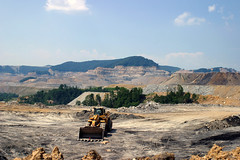 Over at Coal Tattoo, Ken Ward Jr. flags some real talk from a coal industry analyst:
Over at Coal Tattoo, Ken Ward Jr. flags some real talk from a coal industry analyst:Calling the uncertain future of Central Appalachian coal mining the “elephant in the room,” industry consultant Alan Stagg said he expects mining in the high-cost region to cease in the next 10 to 20 years. Speaking at Platts Coal Marketing Days on Sept. 21, Stagg said producers in Central Appalachia need to accept that difficult physical mining conditions, combined with inescapable regulatory restrictions, will soon erase profitability.Blaming treehuggers is way easier than admitting to your investors, consumers & policy-makers that you picked all the low-hanging fruit decades ago & every remaining ton of coal (or barrel of oil) will be increasingly expensive to extract.
“This is the elephant in the room. No one wants to acknowledge that reserve depletion is profound,” said Stagg, president and CEO of Stagg Resource Consultants Inc. “Mining conditions are difficult, and the cost to produce is high. That is a physical fact. It’s not pleasant. Nobody wants to acknowledge it. That is a fact, and companies that ignore that fact will not do so well.” [...]
“Are recent regulatory pressures a straw man in addressing problems facing the coal industry?” he asked. “Even if U.S. coal companies got all of their permits, what would they do with them? You cannot sell that coal at $40, $45 or even $50 per ton.”
Meanwhile Reuters reports, "Asian economies, hungry for coal, stand to gain from a U.S. program meant to keep domestic power cheap and abundant." How much is at stake? "One analyst concludes that the federal government missed out on nearly $30 billion in revenue over the last three decades through poor management of the coal lease program."
Talk about picking winners & losers! How much better off would we be right now if the government had let the free market decide our power sources & just cut $30 billion in checks directly to help Americans pay their power bills?
Eliminating coal subsidies now would be a small step towards making things right - but right now, it sounds like coal companies need all the government welfare they can get.
Posted by
TheGreenMiles
at
Thursday, October 18, 2012
Despite Media's Best Efforts, Climate Science & Carbon Cuts Still Not Controversial
Americans know global warming is happening and want the federal government to regulate the carbon pollution that's causing it. From a recent Washington Post/Kaiser Family Foundation poll:
A skeptic might point out this question doesn't force a hard choice - what about cost? Well, a 2009 Washington Post poll (when support for climate action was much lower) showed a majority of voters (55%) would support carbon pollution limits even if it cost them $25 a month, a figure far above actual cost estimates.
But studies show the American media keeps reporting climate action as controversial and looking for scientific debate where there is none. Media critic Jay Rosen calls it verification in reverse - un-nailing it.
36. Do you think the federal government should or should not regulate the release of greenhouse gases from sources like power plants, cars and factories in an effort to reduce global warming? Do you feel that way strongly or somewhat?
SHOULD 74% (51% strongly, 23% somewhat)The numbers hold strong across party lines - 87% of Democrats, 73% of independents, and even 61% of Republicans want the federal government to limit carbon pollution. The numbers are backed up by another new poll from the Pew Research Center.
SHOULD NOT 23% (13% strongly, 8% somewhat)
NO OPINION 5%
A skeptic might point out this question doesn't force a hard choice - what about cost? Well, a 2009 Washington Post poll (when support for climate action was much lower) showed a majority of voters (55%) would support carbon pollution limits even if it cost them $25 a month, a figure far above actual cost estimates.
But studies show the American media keeps reporting climate action as controversial and looking for scientific debate where there is none. Media critic Jay Rosen calls it verification in reverse - un-nailing it.
Posted by
TheGreenMiles
at
Thursday, October 18, 2012
Tuesday, October 16, 2012
HEY WORLD, LISTEN UP: AMERICANS ARE TOTALLY GONNA KICK CLIMATE CHANGE'S ASS
THAT'S RIGHT, I SAID TAKE A KNEE, EUROPE/ASIA/AFRICA/WHATEVER OTHER TINY BACKWATER ISLANDS ARE TRYING TO CALL THEMSELVES A CONTINENT THESE DAYS: AMERICA IS HERE TO CONFRONT CLIMATE CHANGE, AND WE ARE GOING TO KICK ITS ASS.
LOOK, IN AMERICA WE DON'T CHANGE OUR RISKY BEHAVIORS - WE JUST KEEP TRYING NEW RISKY CURES THAT MIGHT LET US CONTINUE THE RISKY BEHAVIOR.
SO WE'RE DRILLING FOR MORE OIL THAN EVER WHILE A CALIFORNIA BUSINESSMAN IS DUMPING SHITLOADS OF IRON SULPHATE INTO THE PACIFIC OCEAN.
BECAUSE IF THERE'S A CHANCE WE CAN STILL KEEP POLLUTING OUR AIR AND WATER BY BURNING AS MUCH OIL AND COAL AS WE WANT NO MATTER HOW EXPENSIVE IT GETS, HOW AWESOME WOULD THAT BE? IF WE HAVE TO, I DON'T KNOW, GRIND UP SOME ENDANGERED SPECIES AND BLAST 'EM INTO SPACE, WE SHOULD TOTALLY DO IT, AM I RIGHT BRO?
HIGH FIVE!
LOOK, IN AMERICA WE DON'T CHANGE OUR RISKY BEHAVIORS - WE JUST KEEP TRYING NEW RISKY CURES THAT MIGHT LET US CONTINUE THE RISKY BEHAVIOR.
SO WE'RE DRILLING FOR MORE OIL THAN EVER WHILE A CALIFORNIA BUSINESSMAN IS DUMPING SHITLOADS OF IRON SULPHATE INTO THE PACIFIC OCEAN.
BECAUSE IF THERE'S A CHANCE WE CAN STILL KEEP POLLUTING OUR AIR AND WATER BY BURNING AS MUCH OIL AND COAL AS WE WANT NO MATTER HOW EXPENSIVE IT GETS, HOW AWESOME WOULD THAT BE? IF WE HAVE TO, I DON'T KNOW, GRIND UP SOME ENDANGERED SPECIES AND BLAST 'EM INTO SPACE, WE SHOULD TOTALLY DO IT, AM I RIGHT BRO?
HIGH FIVE!
Posted by
TheGreenMiles
at
Tuesday, October 16, 2012
Tuesday, October 9, 2012
Cutting Lead Exposure Even More Beneficial to Kids Than We Thought
 As fears of childhood lead poisoning swept Boston in the 1980s, The Green Miles distinctly remembers being dragged to the doctor by The Green Mom to have his blood tested for lead poisoning, despite my protestations that no kid so wicked smahht could've been impaired by lead.
As fears of childhood lead poisoning swept Boston in the 1980s, The Green Miles distinctly remembers being dragged to the doctor by The Green Mom to have his blood tested for lead poisoning, despite my protestations that no kid so wicked smahht could've been impaired by lead.Now Slate's Matt Yglesias flags new research adding to the growing mountain of evidence that those fears about lead exposure were not only justified, but understated. The research by Jessica Wolpaw Reyes published in the National Bureau of Economic Research finds cutting lead exposure has made Massachusetts children measurably smarter:
Childhood exposure to even low levels of lead can adversely affect neurodevelopment, behavior, and cognitive performance. This paper investigates the link between lead exposure and student achievement in Massachusetts. Panel data analysis is conducted at the school-cohort level for children born between 1991 and 2000 and attending 3rd and 4th grades between 2000 and 2009 at more than 1,000 public elementary schools in the state. Massachusetts is well-suited for this analysis both because it has been a leader in the reduction of childhood lead levels and also because it has mandated standardized achievement tests in public elementary schools for almost two decades. The paper finds that elevated levels of blood lead in early childhood adversely impact standardized test performance, even when controlling for community and school characteristics. The results imply that public health policy that reduced childhood lead levels in the 1990s was responsible for modest but statistically significant improvements in test performance in the 2000s, lowering the share of children scoring unsatisfactory on standardized tests by 1 to 2 percentage points. Public health policy targeting lead thus has clear potential to improve academic performance, with particular promise for children in low income communities.When we talk about environmental regulations, the public debate centers almost entirely on cost - higher taxes, higher prices, etc. But as David Roberts has detailed, limits on lead have had massively higher benefits than anyone predicted.
It's a lesson worth remembering whenever industries or their allies scream bloody murder about efforts to limit pollutants like mercury, carbon - or even, after all these years and all this research about the massive return on investment, lead.
Posted by
TheGreenMiles
at
Tuesday, October 09, 2012
Monday, October 8, 2012
Things Reporters Can't Say: Mitt Romney is Lying About the Environmental Protection Agency
 It's not that Mitt Romney doesn't have his facts straight about the Environmental Protection Agency. It's not that reasonable people can disagree with the Environmental Protection Agency about the best approach to solving a set of problems. Mitt Romney is choosing to lie about the Environmental Protection Agency because he thinks that will give him a political advantage.
It's not that Mitt Romney doesn't have his facts straight about the Environmental Protection Agency. It's not that reasonable people can disagree with the Environmental Protection Agency about the best approach to solving a set of problems. Mitt Romney is choosing to lie about the Environmental Protection Agency because he thinks that will give him a political advantage.But as Paul Krugman said on ABC's This Week, "The press just doesn’t know how to handle flat-out untruths," so you get articles like this in Politico today:
The GOP presidential nominee is telling voters in Colorado, Nevada, Ohio and Virginia that Obama’s EPA is to blame for wiping out the coal industry. Romney and his surrogates are warning Iowans of EPA plans to regulate for farm dust and railing against the agency for flying airplanes over livestock operations to spy for dirty water.Mitt Romney says something that's not true. Even after widely-available facts to the contrary are pointed out, Mitt Romney keeps saying it anyway. We'll have to leave it there.
In many instances, Romney’s EPA attacks stretch the boundaries of what the agency actually does or can do. The EPA has repeatedly denied any plans for new farm dust rules, and the planes have been used as a cost-cutting enforcement measure dating back to the George W. Bush administration. Energy experts say the coal industry’s problems are a byproduct of all-time lows in natural gas prices rather than new air pollution requirements that have been subject to legal battles for more than a decade.
How can you tell Romney's lies are calculated and deliberate? Because he often shifts between lies and the truth depending on his audience. Talking to the Republican National Convention? Global warming's a joke. Talking to scientists? Global warming's serious business. It's part of the fabric of his campaign, as Romney's brazen lies in the first presidential debate about his $5 trillion tax cut plan and letting insurance companies deny coverage to sick people showed.
Romney is counting on articles like this to make his clear-cut lies seem debatable. As media critic Jay Rosen writes, "a post-truth campaign for president falls into the category of too big to tell."
UPDATE 10/9: As usual, The Onion can say it, but political reporters can't. "People are usually too afraid to ask me straight up if I’m lying, because that is apparently not something you ask someone who is running for president."
Posted by
TheGreenMiles
at
Monday, October 08, 2012
Thursday, October 4, 2012
Big Bird vs. Big Oil
The climate crisis didn't come up in last night's presidential debate as moderator Jim Lehrer made sure Barack Obama and Mitt Romney wandered aimlessly from how much to destroy Social Security & Medicare to reduce the deficit to how many federal workers to lay off to reduce the deficit.
But Mitt Romney had another idea to cut the deficit: Fire Big Bird. It was a ZINGER!! so effective that pundits are already asking whether it will blow the bounce Romney may have otherwise received.
There's just one thing Romney won't do to cut the deficit: Ask incredibly rich people or rich corporations (or rich corporate people) to give up a dime in tax breaks or subsidies. That prompted Oil Change International & The Other 98 Percent to team up on the infographic of the night:
But Mitt Romney had another idea to cut the deficit: Fire Big Bird. It was a ZINGER!! so effective that pundits are already asking whether it will blow the bounce Romney may have otherwise received.
There's just one thing Romney won't do to cut the deficit: Ask incredibly rich people or rich corporations (or rich corporate people) to give up a dime in tax breaks or subsidies. That prompted Oil Change International & The Other 98 Percent to team up on the infographic of the night:
Posted by
TheGreenMiles
at
Thursday, October 04, 2012
Paul Ryan Won't Tell You Which National Parks He'd Sell Off, Either
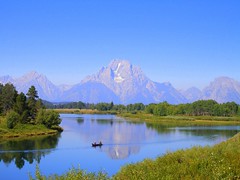 Everyone knows Paul Ryan doesn't want to explain the math behind the Romney-Ryan $5 trillion tax cut for the wealthy, but in a new interview with Outdoor Life, he doesn't have any more interest in explaining their plan to sell off America's public lands:
Everyone knows Paul Ryan doesn't want to explain the math behind the Romney-Ryan $5 trillion tax cut for the wealthy, but in a new interview with Outdoor Life, he doesn't have any more interest in explaining their plan to sell off America's public lands:OL: In your 'Path to Prosperity' budget plan, you have several proposals to sell government property, from things like automobiles to buildings to federal land. Can you give me an example of some type of public land that may fall under that plan?It's a clear part of the Romney-Ryan strategy: We won't tell you what our plans are, you just have to trust us that we'll slash taxes & it'll maybe cost nothing, gut health care but I bet you'll pull through, and auction off America's public lands but I'm sure Big Oil doesn't want the good ones so we'll fill in that blank later.
PR: Not off the top of my head, I couldn’t.
OL: What criteria, though, will you use?
PR: That would be something you have to work with Congress on. There have been lots of hearings that Congress has had on excess federal properties. The ones that we’ve looked at from budget savings were more buildings and assets like cars and things like this, a lot of vacant properties. That is really where a lot of our concern for budget savings has been. With respect to federal lands, that would take a lot more research to give you a good answer.
OL: So that’s not really a main part of that, though?
PR: That part, we thought the savings was buildings.
Posted by
TheGreenMiles
at
Thursday, October 04, 2012
Wednesday, October 3, 2012
Imma Let Teddy Finish, But the Real TR is the Best of ALL TIME
I'm really happy for the Washington Nationals racing mascot Teddy, who finally won today's race after opening his career with a 525-race losing streak.
But the real Theodore Roosevelt established 150 National Forests, 51 Federal Bird Reservations, 4 National Game Preserves, 5 National Parks, 18 National Monuments, 24 Reclamation Projects, and 7 Conservation Conferences and Commissions.
Oh, and he got shot in the chest, got up, said "it takes more than that to kill a Bull Moose," and gave a 90 minute speech before finally relenting and letting his staffers take him to the hospital.
THAT'S winning.
But the real Theodore Roosevelt established 150 National Forests, 51 Federal Bird Reservations, 4 National Game Preserves, 5 National Parks, 18 National Monuments, 24 Reclamation Projects, and 7 Conservation Conferences and Commissions.
Oh, and he got shot in the chest, got up, said "it takes more than that to kill a Bull Moose," and gave a 90 minute speech before finally relenting and letting his staffers take him to the hospital.
THAT'S winning.
Posted by
TheGreenMiles
at
Wednesday, October 03, 2012
Wildfires Destroying Colorado: Worth Debating?
 Tonight's presidential debate will be held in Colorado, where wildfires recently burned 202,425 acres of land (316.3 square miles). Those wildfires killed five people, forced the evacuation of 34,500 people, and destroyed over 600 homes.
Tonight's presidential debate will be held in Colorado, where wildfires recently burned 202,425 acres of land (316.3 square miles). Those wildfires killed five people, forced the evacuation of 34,500 people, and destroyed over 600 homes.It's part of a pattern: Scientists say global warming is making large wildfires more frequent and more intense. America's next president will have to address the problem in both the short-term (more federal money going to disaster response & relief) and in the long-term (cutting carbon pollution and/or dealing with our constantly-rising cost of inaction).
Seems like something that's worth having Barack Obama and Mitt Romney discuss at tonight's debate, don't you think?
Posted by
TheGreenMiles
at
Wednesday, October 03, 2012
Tuesday, October 2, 2012
We Only Eat Ugly Animals: Octopus Edition
At his Animal Oddities blog, my National Wildlife Federation coworker David Mizejewski just posted this clip of a clever octopus stealing a jar of food:
Look, I eat salmon, pigs and turkeys as often as I can, so let me state in advance I'm aware my questions here are at least a little hypocritical.
Dolphins are smart, friendly and cute, so Western society has made the collective decision that we don't eat them.
Octopuses are smart, friendly and ugly, so we eat 80 million tons a year, overfishing them to the point of declining catches. How does that work?
When do we decide we've learned enough about a species that we're now uncomfortable eating it? And when we have a vast overpopulation of cute but dumb & delicious animals like deer, at what point do we non-hunters start looking on them less as Bambi and more as food? Who asks the questions? Who decides the answers?
Look, I eat salmon, pigs and turkeys as often as I can, so let me state in advance I'm aware my questions here are at least a little hypocritical.
Dolphins are smart, friendly and cute, so Western society has made the collective decision that we don't eat them.
Octopuses are smart, friendly and ugly, so we eat 80 million tons a year, overfishing them to the point of declining catches. How does that work?
When do we decide we've learned enough about a species that we're now uncomfortable eating it? And when we have a vast overpopulation of cute but dumb & delicious animals like deer, at what point do we non-hunters start looking on them less as Bambi and more as food? Who asks the questions? Who decides the answers?
Posted by
TheGreenMiles
at
Tuesday, October 02, 2012
Subscribe to:
Comments (Atom)


